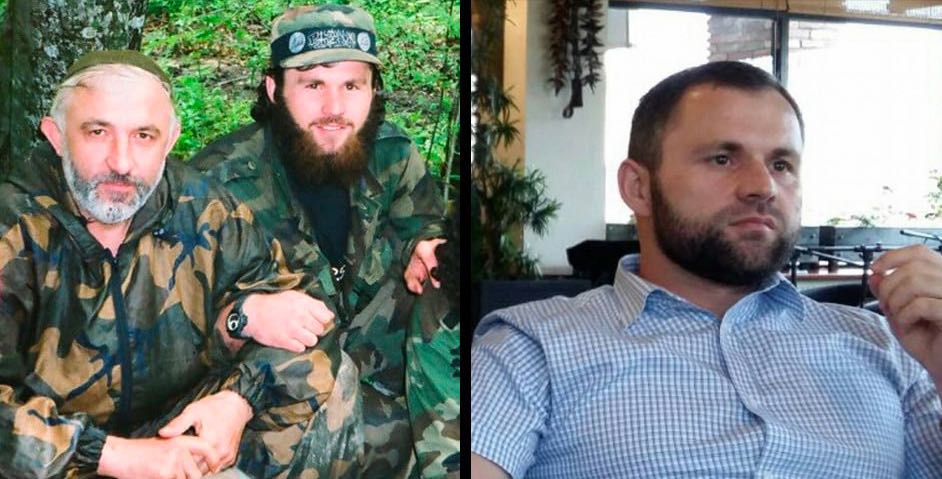Two weeks ago in Berlin a Chechen enemy of the Kremlin was murdered by, presumably, a contract killer dispatched from Moscow. Germany responded barely, in stark contrast to the vehement British reaction to the murder attempt at Skripal in Salisbury. According to security expert Mark Galeotti it shows that Russian policy making is often 'driven by powerful intangibles such as honour, vengeance and reputation'. Russia shows that it 'will not recognise the boundaries of geopolitical etiquette and established norms'.
 Zelimkhan Khangoshvili, left with former Chechen president Aslan Maskhadov, murdered in Berlin (picture Facebook via Bellingcat)
Zelimkhan Khangoshvili, left with former Chechen president Aslan Maskhadov, murdered in Berlin (picture Facebook via Bellingcat)
Berlin, 23 August. Ethnic Chechen Georgian Zelimkhan Khangoshvili, a long-time enemy of the Kremlin and its Chechen satrap Kadyrov, was heading to the mosque for Friday prayers. Suddenly a man who had been hiding in the bushes stepped out and shot him in the shoulder, and then twice at close range in the head, using a silenced 9mm Glock 26 automatic pistol.
The killer then fled the scene, quickly thereafter ditching his gun, his wig and the very 21st century escape vehicle he had been using – an electric bike – in the river Spree. What could have been a clever move to change his look and profile and make sure he was not caught with the murder weapon on him proved his undoing. Two teenagers observing him felt that this was suspicious and reported him to the police. He was soon under arrest.
The mystery
The assassin turned out to be a Russian, going by the name Vadim Andreevich Sokolov and travelling on a French visa. The visa was genuine - although there are questions to be asked quite how he got it, and so quickly - but nothing else about his identity appears real. While the German authorities are characteristically cautious, the citizen investigation outfit Bellingcat with equally characteristic speed, burned through his legend, as intelligence agencies' fake identities are known.
There appears to be no such person as 'Vadim Sokolov', the address he gave for his visa was spurious, and his passport seems to be a cover one issued for the purpose by the same office at Russia's Federal Migration Service as issued the bogus ones for the infamous 'Petrov' and 'Boshirov' tasked with trying to murder Sergei Skripal in the UK last year.
Khangoshvili was a long-time thorn in Russia's side. He fought on the rebel side during the Second Chechen War, and continued to help insurgents from Georgia’s neighbouring Pankisi Gorge region thereafter. When Russian forces invaded Georgia in 2008, he volunteered to fight against them again.
'Nothing and no one just forgotten', as the old Soviet Second World War slogan has it, and he was then targeted for death. After the second assassination attempt against him, in Tbilisi in 2015, he fled first for Ukraine - where he reportedly continued to receive threats - and then Germany, where he had been seeking political asylum.
There can be little doubt that Chechens active in supporting the anti-Moscow and anti-Kadyrov insurgency are considered fair game. Mostly, though, the threats they face come from Chechnya, as its president Ramzan Kadyrov is notoriously careless of the potential consequences of his murderous feuds.
'Sokolov' does not appear to be a Chechen, though, but nor does he have the profile of a Russian intelligence service operator. He seems to have been operating alone (although there may have been a spotter watching the operation unfold, and likewise it is likely his gun was procured separately and stowed somewhere for him to colleagues), whereas professions tend to operate in teams.
He also has tattoos, reportedly a crown, a snake and a panther. These essentially preclude him from being a regular officer of the Foreign Intelligence Service (SVR). They are also not the kind of tattoos affected by paratroopers and Spetsnaz special forces soldiers of the sort often recruited by the GRU, military intelligence. Instead, they sound like criminal or prison ink. The crown often denotes a low-level criminal authority, while the panther is characteristic of certain labour camps, for example.
If he turns out to be a common criminal hired for the purpose, that could still indicate a patron in Grozny, but the fake passport make it more likely that he was rather working for the Federal Security Service (FSB). After all, the FSB interprets its counter-terrorism role very broadly, is authorised to conduct assassinations abroad, and also has a track record in hiring gangsters as hitmen, not least witnessed in the use of carjackers from Moscow to murder another Chechen, Ruslan Israpilov, in Turkey in 2016.
The hubris
Perhaps the biggest mystery is quite why Moscow thought Khangoshvili's death worth the costs. Presumably they thought 'Sokolov' would escape - although any plan has to consider the possibility of failure - but even if he had managed to disappear, suspicion would inevitably have fallen on Russia. It could be that the Russians presumed that, without hard evidence, Berlin would hold back from making any direct allegations or complaints, but even so, the event would have coloured attitudes towards the Kremlin.
 Possible contract killer 'Vadim Sokolov' as detected by Bellingcat on his visa application (picture Bellingcat)
Possible contract killer 'Vadim Sokolov' as detected by Bellingcat on his visa application (picture Bellingcat)
As it is, even if 'Sokolov' refuses to talk (and there are reasons why Moscow prefers to use professional intelligence officers when it can rather than mercenary gangsters), he becomes a symbol of an arrogant and murderous regime. No doubt there are further revelations to come about who he really is, how he obtained his weapon and the like, a steady drip that will keep the matter in the public eye.
Whether or not this triggers the kind of international response that followed the Skripal case remains to be seen, and depends very much on German persuasion and intent. It certainly strengthens the case for some more institutional forms of solidarity between Western countries to respond to non-military aggression. NATO's success has precisely been to embody that kind of common front against direct threats, but until recently lower-level aggressions such as cyberattacks, assassinations and political interference were essentially considered a purely national issue. That may begin to change, something that distinctly may constrain the Kremlin's freedom of manoeuvre.
But quite likely it is not. It is quite striking that so far, a week on, the German government seems determined to avoid a fuss. The killing is being treated as a common crime rather than an act of murderous statecraft, and without Berlin taking a lead, it is hard for there to be any international response of significance.
To be sure, Angela Merkel has reasons to avoid turning this into a cause celebre. Her political position is complex, Germany is still committed to the controversial Nordstream 2 gas pipeline, which Washington is trying to block, and Berlin is still hoping to be able to broker some kind of deal over the Donbas.
The rogue state
So it may look as if Moscow's gamble paid off in a way the Skripal plot - which didn’t even kill its targets - did not. However, it is too early for the Russians to be celebrating and picking their next target. The story will continue to unfold - the Russian newspaper Kommersant has claimed that the killer's identity has already been determined as a certain Vadim Sergeyevich from Siberia - and whether or not Berlin chooses to make a fuss about this specific case, this further establishes Russia's image as a rogue state.
The real question is why Moscow might have thought that murdering a middle-ranking Chechen who had already abandoned the battlefield was worth the risk and the opprobrium. On one level, this likely reflects the essentially emotional calculus behind much Russian policy making, driven by powerful intangibles such as honour, vengeance and reputation.
On another level, one could present this as part of a cognate strategy of projecting a certain image. Having abandoned the hope of making friends in the immediate term, Putin's Kremlin appears to have decided that if it is to be an international bogeyman, then it wants to look like the most fearsome, sharp-toothed and long-armed one possible.
To its enemies, it is saying that it will find them, and end them, wherever they may be. To its interlocutor states, it is saying that it will not recognise the boundaries of geopolitical etiquette and established norms. Rather, it demands to be appeased and assuaged by transactional bargains, its good behaviour bought with concessions.
In the short term, this may look as if it is paying dividends, Merkel being willing to tiptoe around Moscow like around a volatile drunk in a bar. In the wider frame, though, this simply contributes to a vicious circle in which Russia becomes identified as an aggressive and destabilising power and consequent rhetoric and actions in the West simply play to the nationalist and paranoid tendencies that are behind everything from heavy-handed political repression at home (seeing the protests as inspired by Western 'hybrid warfare') to continued and debilitating high security spending. This, one could argue, is a much greater threat to Russia's true interests than any 40-year-old Chechen Georgian in exile...
.
